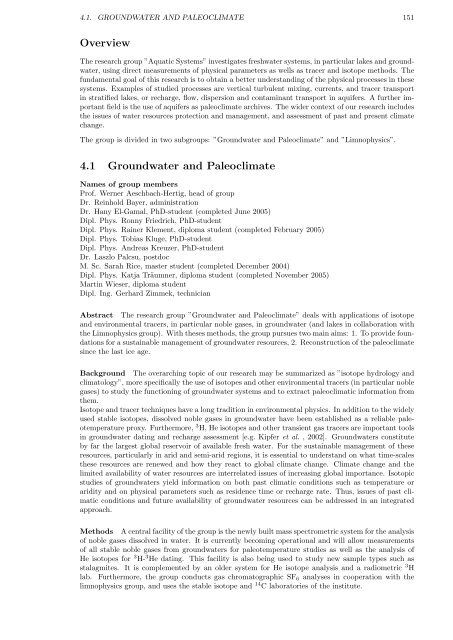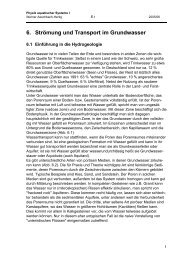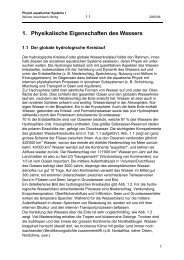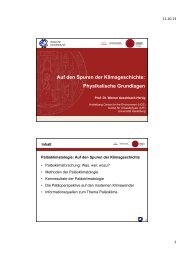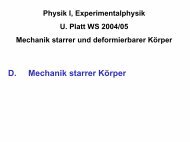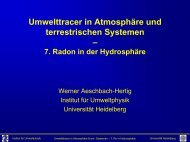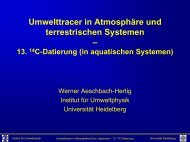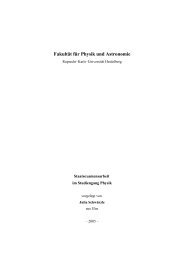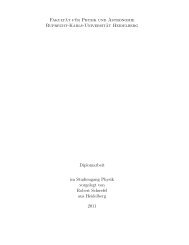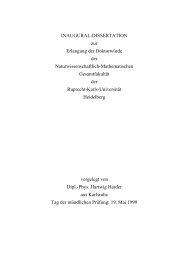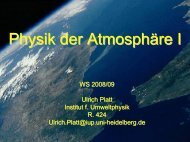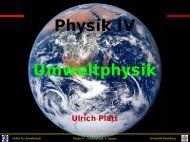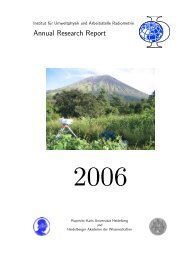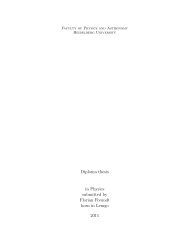download pdf - Institut für Umweltphysik - Ruprecht-Karls-Universität ...
download pdf - Institut für Umweltphysik - Ruprecht-Karls-Universität ...
download pdf - Institut für Umweltphysik - Ruprecht-Karls-Universität ...
You also want an ePaper? Increase the reach of your titles
YUMPU automatically turns print PDFs into web optimized ePapers that Google loves.
4.1. GROUNDWATER AND PALEOCLIMATE 151<br />
Overview<br />
The research group ”Aquatic Systems” investigates freshwater systems, in particular lakes and groundwater,<br />
using direct measurements of physical parameters as wells as tracer and isotope methods. The<br />
fundamental goal of this research is to obtain a better understanding of the physical processes in these<br />
systems. Examples of studied processes are vertical turbulent mixing, currents, and tracer transport<br />
in stratified lakes, or recharge, flow, dispersion and contaminant transport in aquifers. A further important<br />
field is the use of aquifers as paleoclimate archives. The wider context of our research includes<br />
the issues of water resources protection and management, and assessment of past and present climate<br />
change.<br />
The group is divided in two subgroups: ”Groundwater and Paleoclimate” and ”Limnophysics”.<br />
4.1 Groundwater and Paleoclimate<br />
Names of group members<br />
Prof. Werner Aeschbach-Hertig, head of group<br />
Dr. Reinhold Bayer, administration<br />
Dr. Hany El-Gamal, PhD-student (completed June 2005)<br />
Dipl. Phys. Ronny Friedrich, PhD-student<br />
Dipl. Phys. Rainer Klement, diploma student (completed February 2005)<br />
Dipl. Phys. Tobias Kluge, PhD-student<br />
Dipl. Phys. Andreas Kreuzer, PhD-student<br />
Dr. Laszlo Palcsu, postdoc<br />
M. Sc. Sarah Rice, master student (completed December 2004)<br />
Dipl. Phys. Katja Träumner, diploma student (completed November 2005)<br />
Martin Wieser, diploma student<br />
Dipl. Ing. Gerhard Zimmek, technician<br />
Abstract The research group ”Groundwater and Paleoclimate” deals with applications of isotope<br />
and environmental tracers, in particular noble gases, in groundwater (and lakes in collaboration with<br />
the Limnophysics group). With theses methods, the group pursues two main aims: 1. To provide foundations<br />
for a sustainable management of groundwater resources, 2. Reconstruction of the paleoclimate<br />
since the last ice age.<br />
Background The overarching topic of our research may be summarized as ”isotope hydrology and<br />
climatology”, more specifically the use of isotopes and other environmental tracers (in particular noble<br />
gases) to study the functioning of groundwater systems and to extract paleoclimatic information from<br />
them.<br />
Isotope and tracer techniques have a long tradition in environmental physics. In addition to the widely<br />
used stable isotopes, dissolved noble gases in groundwater have been established as a reliable paleotemperature<br />
proxy. Furthermore, 3 H, He isotopes and other transient gas tracers are important tools<br />
in groundwater dating and recharge assessment [e.g. Kipfer et al. , 2002]. Groundwaters constitute<br />
by far the largest global reservoir of available fresh water. For the sustainable management of these<br />
resources, particularly in arid and semi-arid regions, it is essential to understand on what time-scales<br />
these resources are renewed and how they react to global climate change. Climate change and the<br />
limited availability of water resources are interrelated issues of increasing global importance. Isotopic<br />
studies of groundwaters yield information on both past climatic conditions such as temperature or<br />
aridity and on physical parameters such as residence time or recharge rate. Thus, issues of past climatic<br />
conditions and future availability of groundwater resources can be addressed in an integrated<br />
approach.<br />
Methods A central facility of the group is the newly built mass spectrometric system for the analysis<br />
of noble gases dissolved in water. It is currently becoming operational and will allow measurements<br />
of all stable noble gases from groundwaters for paleotemperature studies as well as the analysis of<br />
He isotopes for 3 H- 3 He dating. This facility is also being used to study new sample types such as<br />
stalagmites. It is complemented by an older system for He isotope analysis and a radiometric 3 H<br />
lab. Furthermore, the group conducts gas chromatographic SF6 analyses in cooperation with the<br />
limnophysics group, and uses the stable isotope and 14 C laboratories of the institute.


